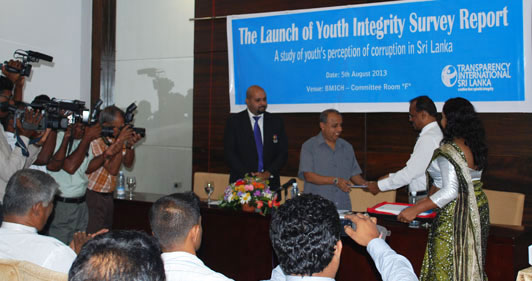One in every three youths in Sri Lanka is willing to raise their voice against corruption always. Another similar number would ‘sometimes’ raise their voice against corruption. This was revealed at a recent survey on integrity done among the youth.
The majority of youth (84%) who participated in the survey believe that the lack of integrity is a serious problem not only in their personal lives but also affect their families, economic prospects and the country as a whole..
The survey conducted by the Transparency International Sri Lanka (TISL) covered 1,005 persons aged 15 to 29. 56% the respondents feel that youth can play a big role in combating corruption and an additional 33% feel that youth can play at least a ‘limited’ role.
TISL believes Youth are the lifeline of our nation. Sri Lanka has a youth population of 5 million, amounting to 26% of the total population. Their role in building an equitable and developed nation free of bribery and corruption is great.
Explaining the purpose of the survey, TISL Executive Director, S.Ranugge said that its main objectives were to assess youth’s knowledge of corruption, to identify their attitudes towards the subject and to understand their willingness to fight corruption along with its challenges. “Youth’s experiences and perceptions of corruption as well their integrity based value systems were also given special consideration through the study” he added.
“The survey found that youths have an important role in the fight against corruption. They had a disappointingly low opinion of public officers, particularly within the police and local administration” said Ranugge.
Only 6% of youth at all education levels felt that they knew ‘a lot’ about corruption rules and regulations and 45% of the youth respondents felt that their voice will not have any effect on corruption. An additional 23% felt that raising their voice against corruption was not their business.
However, a troublingly high percentage of more than 80% would display unethical behavior to get a job or collect an important document. This was more likely for male than female youth, and for rural than urban youth. 40% of urban and 23% of rural youth were willing to engage in unethical behavior in certain situations to please a relative or simply because “it is how things are done”.
According to the survey, urban youth were more likely to value integrity absolutely, than their rural counterparts. Meanwhile, Sri Lankan youth access a wide variety of media, including TV (31%) radio (20%) and mobile phones (18%). However, lack of internet access in most parts of the country has resulted in fewer youth than expected getting information through social media or the internet. (5% and 4% respectively)
TISL is committed towards enabling youth to fulfill their aspirations of living a life of integrity and mobilizing them to do so. “To achieve this we will work with youth to develop new strategies to refuse corrupt transactions, reduce corrupt demands and strengthen integrity amongst police and public officials,” revealed Executive Director, Ranugge.

